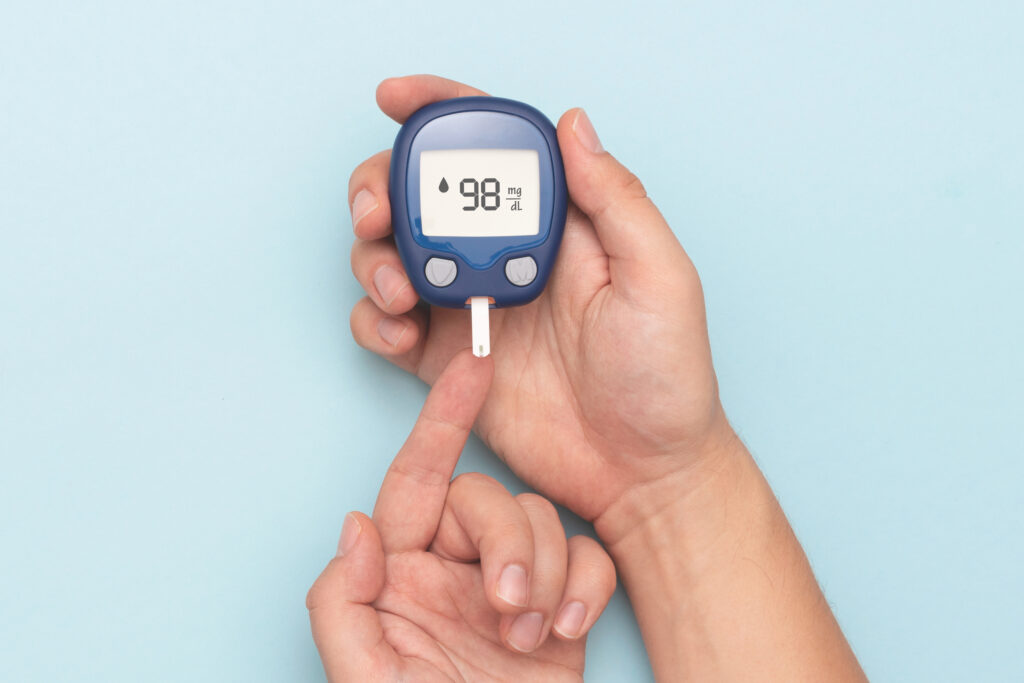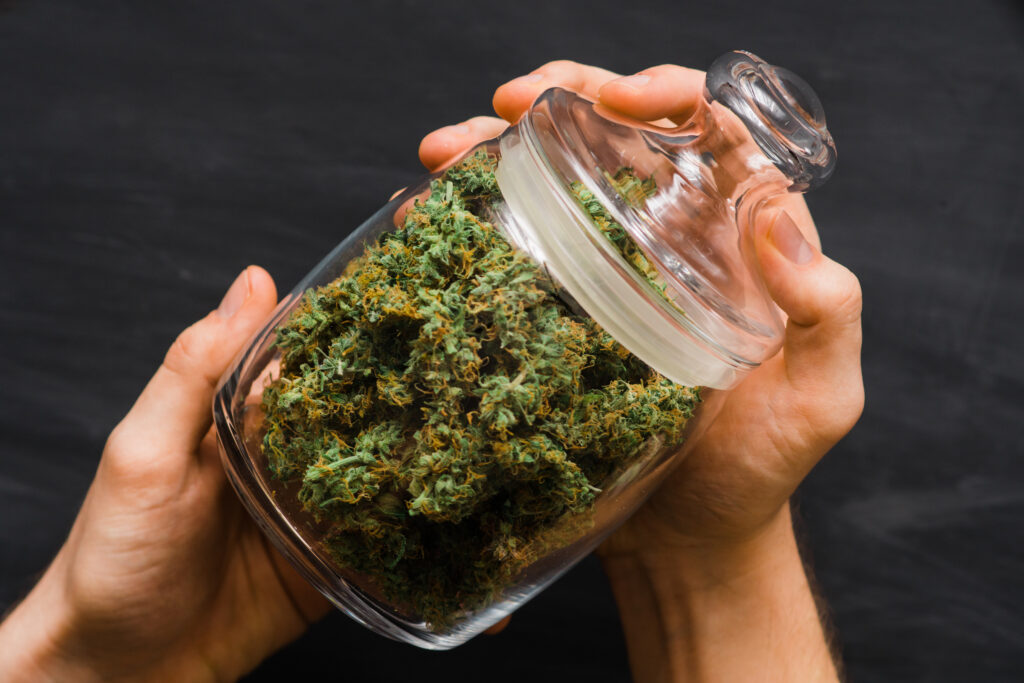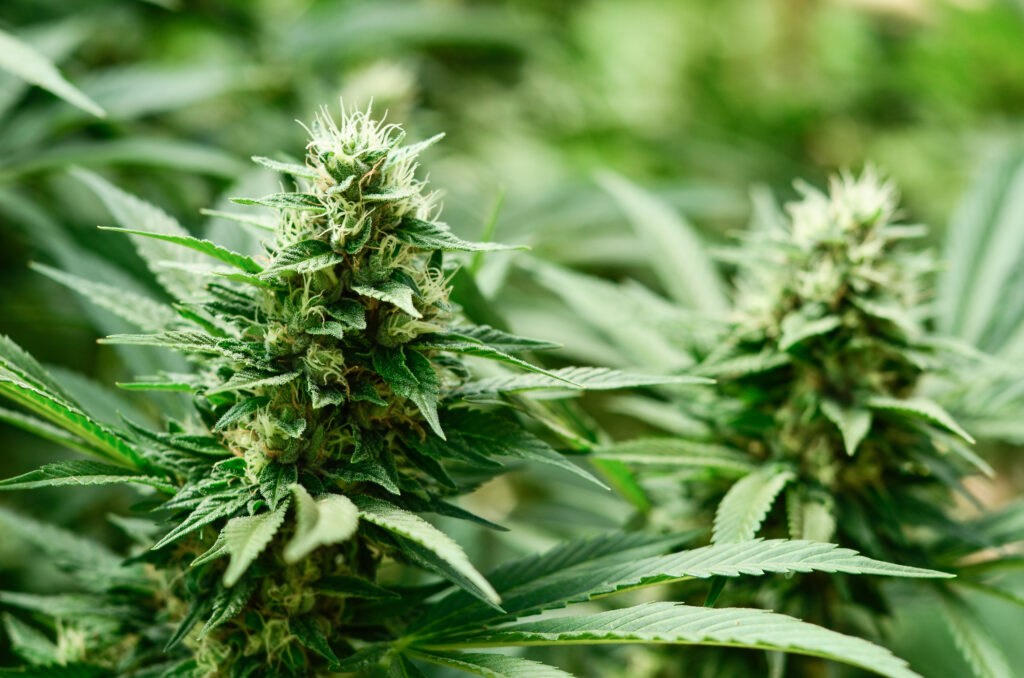Diabetes affects 37.3 million Americans, and 96 million over 18 years old have pre-diabetes. Of note, diabetes isn’t just one medical condition. Rather, there are several different types of diabetic conditions.
Type 1 and type 2 diabetes are arguably the most well-known. Most individuals (90%) with diabetes are diagnosed with type 2. Meanwhile, about 5-10% of cases of diabetes are classified as type 1. There’s also gestational diabetes (which occurs during pregnancy), monogenic diabetes, and secondary diabetes.
There’s currently no known cure for diabetes. Though, there are several ways to manage type 1 and 2 through medication and lifestyle.

Over the years, there’s also been research into “alternative” ways to manage diabetes. Such studies have looked into the safety and efficacy of using cannabis to stabilize blood sugar and other diabetic symptoms, including neuropathy.
Type 1 vs. Type 2 Diabetes
Several key differences between type 1 and type 2 diabetes play significant roles in health and symptom management. Type 1 diabetes is an autoimmune condition that results in the destruction of insulin-producing β-cells within the pancreas. The destruction of these cells causes insulin deficiency, which leads to high blood sugar levels, weight loss, fatigue, and other symptoms.
Meanwhile, type 2 diabetes results from insulin resistance. Either your body stops producing enough insulin, or your body’s response to insulin is diminished. Unlike type 1, it’s believed you can prevent the development of type 2 diabetes through lifestyle factors, such as diet and exercise.
Cannabis & Diabetes Prevention
It may sound counterintuitive to manage blood sugar with a substance known to give the “munchies.” After all, cannabis use is “associated with an acute increase in caloric intake.”
“Despite these associations with increased caloric intake, marijuana use has been associated with lower body mass index (BMI), a lower prevalence of obesity, and a lower prevalence of diabetes mellitus,” a study in The American Journal of Medicine says.
The study assessed over 4,000 participants who completed the National Health and Nutrition Examination Survey and provided blood samples. The participants were screened on their current and previous cannabis use. They also had their blood pressure taken, BMI calculated, and waist circumference measured.
Of the initial 4,657 individuals surveyed, 12% were current cannabis users and 48% had used cannabis at least once in their lifetime.
In several different assessments of the data, the researchers found that current cannabis use was associated with statistically significant lower levels of fasting insulin, blood glucose, and A1C hemoglobin. Current cannabis use was also associated with a smaller waist circumference.
For context, A1C blood tests help measure your average blood sugar levels over the last 3 months.
Based on this data, it’s possible the metabolic effects of cannabis may help prevent the development of type 2 diabetes. However, further research is needed.
It’s also important to note that, even if cannabis does have anti-diabetic properties, it would not work alone to prevent the development of type 2 diabetes altogether.
Getting high and raiding the cookie jar every night without ever exercising doesn’t mean you couldn’t still be at risk of developing diabetes simply because you smoked weed. But these results may imply that cannabis — along with a balanced diet and regular exercise — could help regulate fasting insulin and blood sugar levels.
Additional studies have found supporting and conflicting results, as seen in a Current Diabetes Reports journal review. In this review, the author compares several studies that either find no relationship between cannabis use, body weight, BMI, and diabetes or an inverse relationship between them. In this case, inverse implies cannabis use was associated with lower body weight, BMI, and/or risk of diabetes.
The effects of cannabis on metabolism have been studied extensively, which could, in theory, support the association between cannabis use and lower rates of type 2 diabetes. As always, it’s difficult to control for other factors — genetics, other substance use, stress, physical inactivity, etc… — that may affect study outcomes.
Medical Marijuana For Diabetes: Study Outcomes & Potential Risks

In terms of studies on individuals with diabetes, it’s again important to reiterate that type 1 and type 2 are both different conditions from one another. Type 1 and type 2 diabetes result from different causes and affect insulin in their own way.
Thus, when assessing the effects of cannabis on diabetes, the type of diabetes evaluated in the study must be taken into consideration.
In a randomized, double-blind, placebo-controlled trial, the researchers compared the effects of tetrahydrocannabivarin and CBD on type 2 diabetes. It has previously been observed that THCV increases energy metabolism while decreasing appetite, earning it the nickname “diet weed.”
Following a screening and medication washout-period, the 62 participants in the study either received:
- CBD
- THCV
- 1:1 CBD:THCV
- 20:1 CBD:THCV
- Placebo
By the end of the study, THCV alone significantly reduced fasting blood sugar and improved their 3-hour blood sugar response. THCV also appeared to significantly improve the function of the β-cells in the pancreas.
CBD alone, or the combinations of CBD and THCV, did not result in any significant or favorable changes in the outcomes measured during the study.
“THCV may represent a new therapeutic agent for glycemic control in subjects with type 2 diabetes,” the study concludes.
Yet, there have been studies that suggest cannabis use may have adverse effects on individuals with type 1 diabetes. For example, a study based on survey data found a significant correlation between cannabis use and diabetic ketoacidosis among individuals with type 1 diabetes.
While the authors of the study note there could be potential limitations or biases within the self-reported data, diabetic ketoacidosis can be life-threatening. Thus, these results are vital to consider and assess further in future research.
Does Cannabis Affect Diabetic Neuropathy?
Diabetic neuropathy is a common complication of both type 1 and type 2 diabetes. Neuropathy is the dysfunction of peripheral nerves, which results in numbness, weakness, and pain. It’s estimated that 50% to 60% of all patients with diabetes will eventually develop neuropathy.
“The exact cause of diabetic peripheral neuropathy is not known,” says a StatPearls article. “Theories including metabolic, neurovascular, and autoimmune pathways have been proposed… Perpetually high blood serum glucose appears to lead to damaged small blood vessels, which compromise oxygen and nutrients to the nerves.”
However, the pain-relieving effects of THC and CBD have been well documented across various chronic pain conditions — including those involving neuropathic pain.
In a randomized, double-blind, placebo-controlled crossover study with 16 participants, the researchers evaluated the safety and efficacy of treating painful diabetic neuropathy through inhaled cannabis (vaporized cannabis leaves).
Although it was a small-scale study, the researchers found dose-dependent effects on cannabis’ ability to reduce pain from diabetic neuropathy. Although “low” (1% THC by weight), “medium” (4% THC), and “high” (7% THC) doses all yielded significant reductions in pain, high doses yielded more substantial reductions in pain.
The only adverse effects reported in this study were euphoria and somnolence (drowsiness).
Notably, topical cannabis products are another method of alleviating neuropathic pain without feeling “high” or tired. While it was not touched upon in this study, using THC-infused lotions could be an effective way to alleviate neuropathic pain without worrying about any potential side effects from inhaling or consuming cannabis.
Read More: Topicals or Gummies or Both
Can CBD Reduce Insulin Resistance?
While the study on THCV vs. CBD didn’t reveal any significant impacts from CBD on insulin resistance and blood sugar, one case study yielded different results.
In one case study, a 62-year-old man diagnosed with type 2 diabetes 11 years prior started taking CBD oil to control his blood sugar levels. He started taking CBD oil in place of his former medication, insulin degludec. The patient continued to take his other prescription medications but discontinued his use of insulin degludec after an episode of hypoglycemia (severely low blood sugar).
Initially, the patient was taking 20mg of CBD oil daily. Four months later, he switched to 18mg of CBD twice daily. Around this time, he also self-reported improvements in joint pain management. After 13 months, his A1C levels and weight remained the same.
However, despite the perceived efficacy, the study’s authors warn this one patient’s success does not necessarily mean everyone would have the same outcomes.
“The stable nature of the patient’s A1C and SMBG [self-monitoring of blood glucose] and his general tolerability to this regimen does not suggest that his use of CBD was safe, despite having questionable efficacy in this scenario,” the authors caution. “Additionally, his relatively stable A1C may have been attributable to CBD. Most patients would have significant increases in A1C after discontinuing insulin degludec at the dose the patient was taking.”
Key Takeaways: There is Still Much More to Learn

Diabetes affects over 11% of Americans, and 38% of adults nationwide have pre-diabetes. The majority of individuals with diabetes are diagnosed with type 2.
Several studies have gone back and forth about whether cannabis has any potential therapeutic (or negative) effects on diabetes. It has been repeatedly documented that cannabis use is associated with lower BMI and a lower prevalence of type 2 diabetes. But researchers aren’t quite sure whether this relationship is causational or correlational.
Additional studies have revealed that THCV appears to significantly reduce fasting blood sugar, 3-hour blood sugar response, and improve β-cell function in the pancreas. Studies on THC and diabetic neuropathy have also yielded significant reductions in pain.
But just as there have been positive results yielded, some studies have reported adverse outcomes, as well. One study based on survey data found that cannabis use was associated with twice the risk of diabetic ketoacidosis among individuals with type 1 diabetes.
While there is not enough data to understand whether the relationship between cannabis use and diabetic ketoacidosis was causational or correlational, diabetic ketoacidosis is very serious and could be life-threatening.
Thus, there is a significant need for more research to better understand how cannabis affects both type 1 and type 2 diabetes. There have been a few limited studies on cannabis helping type 2 diabetes, but the same has not been observed for type 1.
In the meantime, the results from studies on THCV look promising and are worth keeping an eye on for the future. Topical cannabis products may also be used to help reduce pain from diabetic neuropathy without it affecting insulin, blood-sugar, or inciting “euphoria.”
References
- Centers For Disease Control and Prevention. (2022, January 18). National Diabetes Statistics Report | Diabetes | CDC. https://www.cdc.gov/diabetes/data/statistics-report/index.html
- Goyal, R., & Jialal, I. (2022, June 19). Diabetes Mellitus Type 2. StatPearls. https://www.ncbi.nlm.nih.gov/books/NBK513253/
- Penner, E. A., Buettner, H., & Mittleman, M. A. (2013). The Impact of Marijuana Use on Glucose, Insulin, and Insulin Resistance among US Adults. The American Journal of Medicine, 126(7), 583–589. https://doi.org/10.1016/j.amjmed.2013.03.002
- Centers For Disease Control and Prevention. (2018, August 21). All About Your A1C. https://www.cdc.gov/diabetes/managing/managing-blood-sugar/a1c.html
- Sidney, S. (2016). Marijuana Use and Type 2 Diabetes Mellitus: a Review. Current Diabetes Reports, 16(11). https://doi.org/10.1007/s11892-016-0795-6
- Jadoon, K. A., Ratcliffe, S. H., Barrett, D. A., Thomas, E. L., Stott, C., Bell, J. D., O’Sullivan, S. E., & Tan, G. D. (2016). Efficacy and Safety of Cannabidiol and Tetrahydrocannabivarin on Glycemic and Lipid Parameters in Patients With Type 2 Diabetes: A Randomized, Double-Blind, Placebo-Controlled, Parallel Group Pilot Study. Diabetes Care, 39(10), 1777–1786. https://doi.org/10.2337/dc16-0650
- Abioye, A., Ayodele, O., Marinkovic, A., Patidar, R., Akinwekomi, A., & Sanyaolu, A. (2020). Δ9-Tetrahydrocannabivarin (THCV): a commentary on potential therapeutic benefit for the management of obesity and diabetes. Journal of Cannabis Research, 2(1). https://doi.org/10.1186/s42238-020-0016-7
- Kinney, G. L., Akturk, H. K., Taylor, D. D., Foster, N. C., & Shah, V. N. (2019). Cannabis Use Is Associated With Increased Risk for Diabetic Ketoacidosis in Adults With Type 1 Diabetes: Findings From the T1D Exchange Clinic Registry. Diabetes Care, 43(1), 247–249. https://doi.org/10.2337/dc19-0365
- Wallace, M. S., Marcotte, T. D., Umlauf, A., Gouaux, B., & Atkinson, J. H. (2015). Efficacy of Inhaled Cannabis on Painful Diabetic Neuropathy. The Journal of Pain, 16(7), 616–627. https://doi.org/10.1016/j.jpain.2015.03.008